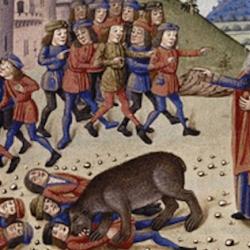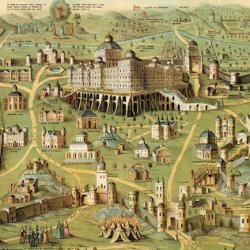INTRODUCTION
Solomon?s marriages led him into idolatry, but the consequences were not confined to Solomon?s own life. Because of his sins, Yahweh raised up adversaries to oppose him and the entire kingdom was torn in pieces. The sins of the king ?Ethe sins of any leaders ?Ehave consequences for the whole people.
THE TEXT
?And Rehoboam went to Shechem, for all Israel had gone to Shechem to make him king. So it happened, when Jeroboam the son of Nebat heard it (he was still in Egypt, for he had fled from the presence of King Solomon and had been dwelling in Egypt), that they sent and called him . . . .?E(1 Kings 12:1-24).
THE ASSEMBLY
The structure of 1 Kings 12 is fairly simple:
A. Coronation, 12:1
B. Delegation requesting relief: delayed 3 days
C. Consultation with elders
C?E Consultation with boys
B?E Return of delegation: after 3 days, decision
A?E No coronation for Rehoboam, instead Jeroboam is made king (v 20)
At the center of the passage, then, Rehoboam consults with two sets of advisors, one giving bad and one giving good advice.
The occasion for the division of the kingdom is the assembly of Israel at Shechem for Rehoboam?s coronation. Shechem was the place where Israel first renewed covenant after the conquest (Joshua 24). In the time of the judges, Abimelech had himself crowned king at Shechem (Judges 9), and the association of Rehoboam with Abimelech is not a compliment to Rehoboam. The place also hints at another dimension of the Jeroboam story. In Genesis 12, Abram enters the land and goes to Shechem, and then moves on to Bethel where he sets up an altar (Genesis 12:6-8). This is the same trip that Jeroboam is about to make, though his altar is not devoted to the true worship of God.
LET MY PEOPLE GO
During this assembly, Jeroboam leads a delegation to ask Rehoboam to lighten the ?weight?Ethat Solomon had placed on the people. Solomon?s kingdom was full of ?glory?E(Heb. kabod ) but this glory piled up heavy burdens (Heb. kabod , which also means ?heavy?E. Jeroboam?s request reminds us of the demand that Moses makes before Pharaoh in Exodus (1:14; 2:23). Solomon had turned to Egypt for horses and chariots, and his kingdom had become an Egyptian-like tyranny from which the true Israel wanted to be freed.
Rehoboam consults with two groups. The first consists of the old men who have been with Solomon, and know something about his wisdom. They give Rehoboam good advice, advice that turns on the repetition of the word ?serve.?EIf Rehoboam is willing to serve the people for a single day, they will be his servants forever. Perhaps this reflects a certain cynicism on the part of the old men. The word ?answer?Ein v. 7 is a pun on the word ?afflict.?EPerhaps they are saying, If you will be a servant today, then you can afflict them tomorrow and they won?t question you. If this is the meaning, then the elders prove themselves not completely wise. But at least they are shrewd.
The same cannot be said of the ?boys?Ewho have grown up with Rehoboam. They don?t want Rehoboam to hide his intention at all; instead of promising the lighten the burden, he should threaten to make the burden heavier (cf. Exodus 5:1-2). Their advice is phrased in vulgar terms: The phrase ?my little finger?Eis literally ?my little thing,?Eand probably is a phallic reference. They are saying, If the people felt ?raped?Eby Solomon, wait until Rehoboam gets ahold of them. Rehoboam follows the advice of the ?boys,?Eanswering the complaint about ?harsh?Elabor by speaking ?harshly?E(vv. 4, 13). Rehoboam was unwise and sinful; but this was all done according to God?s plan, fulfilling the word of Ahijah the Shilonite (v. 25; cf. 1 Kings 11).
NO STAKE IN DAVID
As a result of Rehoboam?s intransigence, ?all Israel?Eabandons the house of David (vv. 16-20). Jeroboam thus ends up ruling ?all Israel,?Ewhich is the same kingdom that Solomon ruled (cf. 11:42). Jeroboam, not Rehoboam, is the real heir of Solomon. Yet, the political division in itself does not destroy the unity of the kingdom. What seals the division is Jeroboam?s religious apostasy, which we will examine next week.
The little story about Rehoboam?s decision not to pursue Jeroboam is important. Remember the exodus themes throughout the whole passage: Jeroboam leads an ?exodus?Eout of the house of David, and in the next chapter is setting up golden calves at Dan and Bethel (v. 28; cf. Exodus 32:4, 8). Rehoboam, the ?Pharaoh?Eof the story, plans to pursue, but does not. This contrasts with the Pharaoh of the exodus, whom Yahweh hardens so much that he rides out to his destruction (cf. Exodus 14:8). Rehoboam?s kingdom is preserved because, unlike Pharaoh, he does not pursue the ?Israel?Ethat departs.
It?s important also to notice the reason why Rehoboam doesn?t pursue Jeroboam. A prophet speaks and warns him not to fight against his brothers (which shows that Israel remains part of the family of Yahweh). The man of God?s name is Shemaiah, which means something like ?Hear Yah?Eor ?Listen to Yah.?ERehoboam does listen to Yahweh (v. 24) and turns. This is a notable contrast with Jeroboam, who is confronted by a prophet in chapter 13 and refuses to listen. Kings who listen to the word of the Lord through the prophet do well; those who refuse to listen perish.











